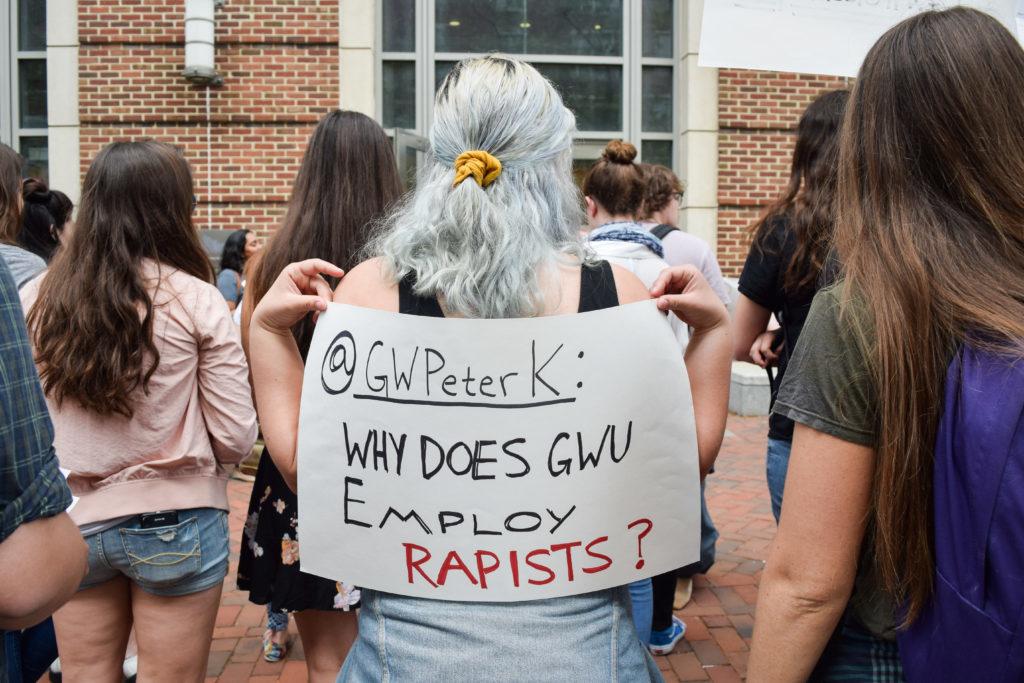Administrators are reviewing the process for handling sexual assault cases after a survivor’s unsuccessful campaign to expel her attacker ignited petitions and protests on campus.
In a statement released April 21, officials said they were exploring ways to improve transparency about sexual assault and released information about the number and outcome of sexual violence cases decided by a University hearing board. Title IX experts said a complete review of how cases are handled would improve areas of communication between survivors and caseworkers and help regain the survivors’ trust.
Earlier this month, senior and sexual assault survivor Aniqa Raihan launched a petition to expel her assailant from the University after he received a deferred suspension for sexual violence, a sanction less severe than the University’s code of conduct recommends. Raihan also started an email campaign calling for the student to be fired from his supervisor position at the Lerner Health and Wellness Center.
Both attempts were unsuccessful, sparking protests from students led by Students Against Sexual Assault.
“The narrative emerging from the petition and related activities suggests that GW has been reluctant or even unwilling to hold individuals accountable for acts of sexual violence,” officials said in a statement. “This narrative concerns us a great deal because of the message it may send to current and future survivors and our campus.”
Caroline Laguerre-Brown, the vice provost for diversity, equity and community engagement, Peter Konwerski, the vice provost and dean of student affairs, and Rory Muhammad, the Title IX coordinator, co-signed the statement.
University spokeswoman Maralee Csellar said the University takes the reaction from sexual assault survivors seriously and that officials are reviewing how cases are handled.
“The University’s Title IX Office and Division of Student Affairs will also continue the dialogue with students about how we can work together to strengthen sexual assault prevention, response and education,” she said in an email.
Csellar said a small number of alumni contacted officials about Raihan’s case and administrators followed up when they deemed it appropriate.
She said the University occasionally releases data on the number and type of cases decided by the Office of Student Rights and Responsibilities and may release information again in the future.
Csellar declined to say why officials decided to release data about these sexual assault cases. She also declined to comment on the specifics of what GW is doing to improve their review process and whether the University has specific plans to address the complaints stated in both Raihan’s petition and email campaign.
Officials have been criticized in the past for the lack of transparency surrounding sexual assault. The Committee on Sexual Assault Prevention and Response, which formed in October 2014, does not release any public reports.
Information about instances of sexual violence is included in the annual campus security report. Officials also started to release an annual campus climate survey on sexual assault in 2014, but plan to conduct it every two years in the future.
The latest survey, released in the fall of 2016, found that sexual assault reports are decreasing on campus, but 91 percent of respondents who said they experienced unwanted sexual behavior did not report it to any authority.
Jocelyn Jacoby, the co-president of SASA, said the University’s statement wasn’t genuine about areas the University needs to improve upon.
“I think the University’s first priority is protecting their image,” she said. “I think they genuinely want students to be safe, however I do believe that there is a culture of sympathizing with perpetrators that needs to be dissolved.”
Jacoby said she spoke with Konwerski April 20 – the day before SASA held a rally outside HelWell. During the meeting, Jacoby said she asked about releasing numbers on the outcome of sexual assault cases at GW.
Officials said in the statement that over the last two academic years, there were 16 reported cases of sexual misconduct that resulted from formal complaints. Ten of those cases went before a formal hearing board and four resulted in the expulsion of the assailant, while five resulted in suspension. One case – Raihan’s – concluded with a deferred suspension.
Jacoby said academic studies show that survivors are more likely to report crimes when information about case outcomes is made public.
A 2009 study from Virginia Commonwealth University found that publicly releasing information about past crimes on campus can encourage survivors to report sexual violence crimes.
Jacoby said to improve communication and transparency, the University should provide survivors with weekly updates about their cases and be open about how sanctions for these types of cases are decided.
After Raihan’s petition went public, several students and alumni posted about the case on social media, saying they were disappointed in the University’s response.
Amina Akhtar, an alumna of the class of 2016, said she learned about Raihan’s case through Facebook and Twitter, and was surprised that the assailant received less than the recommended minimum sanction.
Akhtar added that she no longer wants to donate to the University and will not encourage prospective students to apply to GW.
“My cousin is actually getting ready to apply to universities, and I told her just to apply to Georgetown,” she said. “I mean, it’s my cousin. If they’re handling cases like this it could easily happen to her.”
Julia Dunn, the associate dean of students and Title IX administrator at Whitman College, said universities have the opportunity to review how they can improve the process for every misconduct case on campus.
“We try to keep all of our lines of communication open,” Dunn said. “We try to ensure that students have multiple routes for reporting, while making sure students know that a report does not automatically equal an investigation.”
Annie Dobler contributed reporting.





